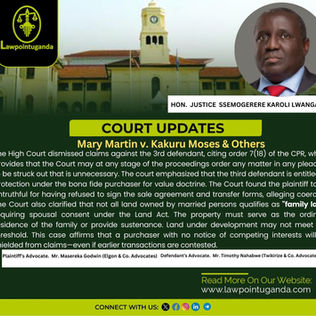top of page
BLOG POSTS
DISCLAIMER
This blog does not contain legal advice. The legal information is provided for general informational and educational purposes only and is not a substitute for professional advice. Accordingly, before taking any actions based on such information, we encourage you to consult with the appropriate professionals. Authors are liable for any plagiarism and Lawpoint Uganda won`t have liability towards the same.


A public institution's internal financial limitations (like dependence on quarterly grants) are generally not a valid defense against a breach of a clear contractual payment term.
The Court noted that the Plaintiff’s own demand letter dated 21 September 2023 (PEX.2) indicated that only UGX 98,050,000 was outstanding at that time. After the UGX 30,000,000 payment, the balance dropped to UGX 68,050,000; however, a new LPO for 10 tons was issued and supplied, restoring the outstanding balance to UGX 105,050,000.

Waboga David
Dec 10, 20253 min read


Registered Ownership Alone Is Insufficient for Injunctive Relief: High Court at Luwero Dismisses Applications in the Face of Demonstrated Equitable Interests and Actual Possession
If the injunction were granted, the Respondent would lose access to a property she has managed for years, along with the benefit of her substantial personal involvement and the protective value of the asset securing the joint loan, exposing her to loss that may not be easily reversed.

Waboga David
Dec 8, 20254 min read


High Court of Kabale Rules That Land Under Development or Not Used as the Matrimonial Home Is Not Family Land Requiring Spousal Consent, and Affirms Validity of Sale and Bona Fide Purchaser Protection
Spousal consent under the Land Act only applies to land that meets the statutory definition of "family land"—i.e., land where the family ordinarily resides or derives sustenance at the time of the transaction. Developing property (at slab level) may not qualify.

Waboga David
Dec 6, 20256 min read


Understanding the Legal Implications of the Netflix-Warner Brothers Merger Agreement
The recent merger agreement between Warner Bros. Discovery (WBD) and Netflix has caught the attention of law students and corporate law enthusiasts alike. This deal is not just significant for the entertainment industry but also offers a fascinating look into complex legal structuring in mergers. The agreement involves a series of internal restructuring steps on WBD’s side before the actual merger with Netflix takes place. Understanding these steps is crucial for anyone inter

Waboga David
Dec 6, 20254 min read


Court of Appeal Upholds Sale of Estate Land by Beneficiaries Before Grant of Administration
The court found that the vendors sold their beneficial interest in the estate land. “The thrust of that provision [S. 188 of the Succession Act] is that actions made in the course of administration relate back to the time of death of the deceased. The effect is that the grant of letters of administration validates legitimate actions of the administrator(s) taken prior to the grant in respect of the estate of an intestate. Specifically, actions which would ordinarily amount to

Waboga David
Dec 5, 20257 min read


An administrator who filed a suit while the grant was still valid retains locus standi to pursue all consequential proceedings, including appeals, notwithstanding the later expiry of the letters.
Letters of administration remain valid for two years, However, any suit instituted during their valid life remains valid throughout, including on appeal. Expiry does not extinguish locus standi for proceedings already commenced.

Waboga David
Dec 5, 20257 min read


How the Proposed USA–Uganda Health Data Sharing Agreement Threatens Privacy Rights
Any agreement involving sensitive health data must be grounded in Clear legal safeguards, Strong oversight, Local control, and Transparent engagement with the public
Uganda stands at an inflection point. A well-negotiated agreement can strengthen health cooperation. A weak one could compromise the digital rights of millions for decades.

Lawpointuganda
Dec 4, 20253 min read


A Reconciliation Agreement or Consent Entered Before an LC1 Court, Being a Court of Competent Jurisdiction, is Binding Under Section 31 (1) of the LCC Act and Unappealable, High Court at Kabale Rules
The Court observed that Reconciliation agreements recorded before an LC1 Court amount to consent judgments, which are final and unappealable under Section 31(1) of the Local Council Courts Act.They may only be set aside on the narrow grounds of fraud, mistake, or misrepresentation, which must be specifically pleaded and strictly proved.

Waboga David
Dec 3, 20256 min read


A mortgage used as security does not automatically transfer ownership, but failure to redeem within the statutory period extinguishes redemption rights. High Court at Mbale Rules
Actions for redemption of mortgaged land must be commenced within twelve (12) years from the date the cause of action accrues. The Court further clarified that limitation extinguishes not only the remedy but the right itself in actions for recovery or redemption of land.

Waboga David
Dec 2, 20257 min read


A claim for unjust enrichment does not require the existence of a contract. What matters is that, money was received, no corresponding benefit was provided, and retention of the money was unjust.
It was held in the case of Uganda Farmers Meat Co. Limited Vs Fresh Cuts Uganda Ltd (supra) that the burden of proving that equity and good conscience does not demand a refund devolves upon the Defendant who offers such a defence to the claim of the creditor. That it is settled law that once the Plaintiff makes out a prima facie case in his favour, the evidential burden shifts to the Defendant to controvert the Plaintiff’s prima facie case; otherwise, judgment must be entered

Waboga David
Dec 1, 20256 min read


Industrial Court of Uganda Says Once Payments Are Documented as “Salary,” an Employment Relationship Is Presumed, Even Without a Contract or NSSF.
The Claimant was removed from the premises partly due to her health status, but the Respondent failed to follow the statutory and judicial procedures governing termination due to ill health. Applying the principle from Stanbic Bank (U) Ltd v Nassanga, the Court held:
“Where an employer gives a reason for termination, then it must hold a hearing.” The Claimant was never accorded any disciplinary hearing, rendering the termination procedurally unfair.

Waboga David
Nov 30, 20258 min read


High Court at Kabale Clarifies When Spousal Consent Applies and Distinguishes Family Land from Matrimonial Property, and Temporary Gifts
The Court established that a finding of matrimonial property is normally associated with the dissolution of a marriage, rather than death. in any event, death would end the marriage and the provisions of the law of succession under Section 2 of the succession act would apply. Court citing the case of Mary Martin V Kakuru Moses and 2 others HCT-11-CV-CS-0036, stated that the land may have become family land at the time the sale was entered into. in the instant case, once a fi

Waboga David
Nov 28, 20257 min read


High Court Rejects Application to Set Aside Default Judgment, Finding Counsel Negligent Despite ECCMIS Notifications
To set aside a decree under Order 36 Rule 11, the Applicant must demonstrate "any other good cause." Claiming a mere oversight or a notification delay, especially when contradicted by reliable system evidence, does not meet this threshold.

Waboga David
Nov 28, 20255 min read


LC II Courts still have original jurisdiction over land disputes, pursuant to Section 76A of the Land Amendment Act (2004), as affirmed by the Court of Appeal. High Court Reaffirms
The Court relied on the Court of Appeal decision in Nalongo Burashe v Kekitiibwa Magdalena, Civil Appeal No. 89 of 2011, which held that LC II Courts (Parish/Ward Executive Committee Courts) have original jurisdiction in land matters. The Judge found that the Court of Appeal decision overrides earlier conflicting High Court decisions. Therefore, LC II Courts do retain original jurisdiction in land matters.

Waboga David
Nov 28, 20255 min read


Once a lease is registered, Uganda Land Commission’s role ends. High Court at Kampala Quashes ULC's Decision to Rescind Lease and Deny Consent to Transfer.
The Court found that ULC had absolutely no power to rescind a lease once it had been registered under the RTA. “Once the respondent issues a lease and the lease is registered on the title, the respondent does not have the powers to rescind or cancel that lease.”...“There are procedures by which land under the RTA may be de-registered… Failure to comply renders the decision a nullity.”

Waboga David
Nov 26, 20256 min read


High Court at Kabale Convicts Minors of Murder Based on Motive and Police Canine Tracking
To successfully raise an alibi, the defense must effectively demonstrate that the accused had no opportunity to commit the crime. A simple denial is insufficient against compelling circumstantial evidence.

Waboga David
Nov 26, 20256 min read


Only the Secretary of ULC, not the Chairperson, may issue official correspondence. Any allocation communicated contrary to s.51(3) of the Land Act is illegal and void.High Court at Kampala Reaffirms
The Court examined Article 239 of the Constitution (ULC functions) Section 51(3) of the Land Act (only the Secretary conducts ULC correspondence) Minute 20-2 of 31st March 2015 The minute clearly indicated the application was deferred, not approved.
The letters (PE3 and PE7) from the ULC Chairperson were held invalid because they violated s.51(3) of the Land Act:
“I find that the communication through the two letters by the Chairperson of the Commission, PE3 and PE7, were i

Waboga David
Nov 25, 20255 min read


Where a juvenile is held in an adult prison in violation of the Children Act, the Court has the power to discontinue criminal proceedings; High Court at Kabale Reaffirms
While citing Section 136 (6) of the Children Act Cap 62, which states that a child shall not be remanded in an adult prison, court declared the trial of the applicant illegal and discontinued all criminal proceedings against him. This was because the applicant AJ, A6 on the indictment was remanded in prison on November 11, 2024 and he had been held in the two Ugandan government prisons of Kisoro and Ndorwa, in Kisoro and Kabale districts respectively.

SSALI JUNIOR JOHN NDIGEJJERAWA KIGONGO
Nov 24, 20257 min read


Constitutional Court of Uganda Dismisses Petition by Civilian Challenging Court Martial Conviction
The Court held that the petitioner did not fall within the exception set out by the Supreme Court's ruling in Kabaziguruka that allowed for the retrospective application of the unconstitutionality finding, as her conviction and sentence were no longer "being challenged in a court of law" within the context of the military justice system or its ordinary appeals.

Waboga David
Nov 23, 20255 min read


“When You Institute a Suit, You Don’t Go to Sleep: High Court Reinforces Mandatory Compliance with Procedural Rules”
“The 28 days within which the Plaintiff was supposed to take out summons for directions have since elapsed. Therefore, the Plaintiff did not comply with the mandatory provision of Order 11A, Rule 1 (2) of the Civil Procedure Rules.”

Waboga David
Nov 22, 20253 min read


High Court Clears Equity Bank After Controversial UGX 65 Million Withdrawal From a Customer's Savings Account, Says Court Orders Must Be Obeyed
The Court examined whether the bank breached its fiduciary obligations when it acted on the order. In doing so, it adopted both English and Ugandan jurisprudence on freezing and garnishee orders, particularly the landmark decision in Customs & Excise Commissioners v Barclays Bank Plc, later followed by the Supreme Court of Uganda in Arim v Stanbic.“A bank’s relationship with its customers is subject to the law of the land… It seems to me in the final analysis unjust and unrea

Waboga David
Nov 22, 20257 min read


“In determining whether a person is a bona fide occupant, the Court only has to consider the duration a person has been in occupation of land.” Court of Appeal Rules.
The Court found that the trial judge erred when he concluded that the Respondent was a bona fide occupant within the meaning of the land law framework. The Court emphasized that bona fide occupancy is strictly defined by statute, including the cut-off dates for occupation.
This observation confirms that occupation commencing in 1993 falls outside the statutory protections accorded to bona fide occupants. The Court therefore held that the trial judge misapplied the law by exte

Waboga David
Nov 19, 20256 min read


Court of Appeal Clarifies Evidentiary Requirements for Local Government Claims to Pre-Independence Customary Land and Addresses Effect of Locus in Quo Irregularities
A local government claiming pre-independence customary grant (1915) must produce credible evidence of (a) actual alienation by the colonial authorities or recognised customary grant and (b) continuous utilisation. Mere oral tradition and long use by parish chiefs was held insufficient when contradicted by documentary evidence of private inheritance.

Waboga David
Nov 19, 20255 min read


High Court at Kampala Confirms Police-Impounded Property Still Enforceable as Collateral
The Court cited the statutory position that: “Where the enforcement of a security interest is commenced by a secured creditor other than the secured creditor whose right has priority over that of the enforcing creditor, the secured creditor shall be entitled to take over the enforcement at any time before the sale of the collateral.”
The Court further observed that lodging a caveat promptly—as was done on 18th August 2022—solidifies a creditor’s priority under the Security I

Waboga David
Nov 17, 20257 min read
Follow us:
bottom of page
























.jpg)
